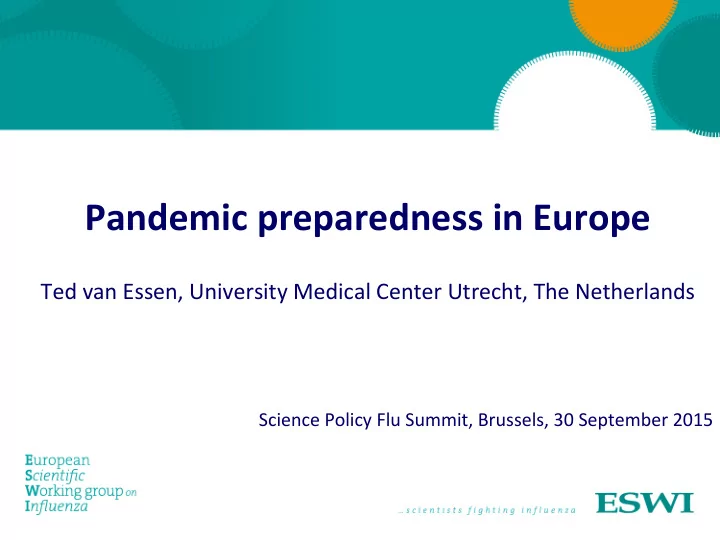

Pandemic preparedness in Europe Ted van Essen, University Medical Center Utrecht, The Netherlands Science Policy Flu Summit, Brussels, 30 September 2015
Recent avian influenza virus outbreaks are a strong reminder of the fact that flu viruses are unpredictable and constantly changing
Structure of influenza A or B Neuraminidase Polymerase Haemagglutinine RNA Matrix Proteine Lipid layer Ribonucleoproteine
Influenza A virus reservoir
Influenza - Zoonotic events - Subtype Year, country Confirmed cases (fatalities) Illness H5N1 1997/2003-present, Asia, Europe, Africa 667 (393) ILI, pneumonia, encephalitis H6N1 2013, Taiwan 1 (0) ILI 2003, USA 1 (0) ILI H7N2 2007, UK 4 (0) Conjunctivitis, ILI 2004, Canada 2 (0) Conjunctivitis, ILI H7N3 2006, UK 1 (0) Conjunctivitis 2012, Mexico 2 (0) Conjunctivitis 1996, UK 1 (0) Conjunctivitis H7N7 2003, Netherlands 89 (1) Conjunctivitis, ILI, pneumonia 2013, Italy 3 (0) Conjunctivitis H7N9 2013, China, Taiwan, Hong Kong 450 (165) (27 june, 2014) ILI Richard et al., H9N2 1999 - present, Hong Kong 7 (0) ILI Future Virology, 2014 2004, Egypt 2 (0) ILI H10N7 2010, Australia 2 (0) Conjunctivitis H10N8 2013, China 3 (2) Pneumonia
7
Pandemic preparedness: five pillars § Surveillance and detec6on § An6viral stockpiling § Vaccina6on § Non-medical measures § Communica6on
ESWI FluQuest Survey • ComparaMve analysis of pre and post pandemic plans in nine European countries: Austria, Belgium, the Czech Republic, Finland, France, Germany, the Netherlands, the UK and Turkey • Data collecMon August 2012 unMl August 2013 • Purpose: to learn about Europe’s level of pandemic preparedness and enhance European preparedness for the next influenza pandemic • General trends and conclusions widely disseminated
Has European pandemic preparedness improved since FluQuest?
Preparedness plan updates are oBen postponed § SMll, a minority of 8 out of 28 EU countries has updated its pre-pandemic preparedness plan § Many countries lack the urgency to revise their plans, for a variety of reasons: § Lack of poliMcal interest § Lack of scienMfic consensus over pandemic evaluaMon § WaiMng for coordinated response by internaMonal community (WHO/ECDC)
Revised pandemic preparedness plans based on lessons learned: § Flexibility built in, response is dependent on actual circumstances § WHO pandemic phasing largely abandoned § New WHO Pandemic Influenza Risk Management Guidance issued in 2013 § Countries now strongly advised to develop their own naMonal risk assessments based on local circumstances
13
Antiviral stockpiling: current antiviral drugs for influenza Class/An(viral drug Brand name Route M2-channel inhibitors Ø Amantadine Symmetrel Oral Ø Rimantadine Flumadine Oral Neuraminidase inhibitors Ø Oseltamivir Tamiflu Oral Ø Zanamivir Relenza Inhaled Ø Peramivir * Peramiflu IV Ø Laninamivir * Inavir Inhaled * Not licensed in Europe
An6viral stockpiling § Large-scale anMviral stockpiling since 2005 due to intense fears of an imminent H5N1 avian influenza pandemic § Controversy has arisen due to: § ‘mild’ course of 2009 H1N1 pandemic § quesMons of effecMveness § It is now unclear whether individual countries are maintaining stockpile level to ensure conMnued preparedness
17
Pandemic Influenza Vaccine Procurement § Some countries currently have Advanced Purchase Agreements in place with vaccine producing companies. § In post-pandemic era, governments are hesitant to openly communicate about agreements with vaccine producing companies § Joint Procurement Agreement in place since 20 June 2014 § On 22 September 2015, France became the 22nd EU country to sign the agreement
walking backwards 19
Health Care Capacity § Although primary care and hospital care systems were able to cope with all paMents during this relaMvely mild pandemic, it is esMmated that many countries were close to 100% occupaMon of hospital capaciMes § Consequently, hospital capacity would have been overstretched if pandemic would have been worse § Triage? § Lack of hospital capacity in case of severe pandemic is not addressed in pandemic preparedness plans §
Pandemic Influenza Communica6on § Several European countries chose not to install a single flu spokesperson to inform the public at large § Trial and error communicaMon during pandemic leh room for confusing messages on social media § There was a clear need for concerted communicaMon on an internaMonal level in order to spread uniform messages (quesMon of leadership) Where are we now?
Conclusions § Flu viruses are unpredictable and are constantly changing § European policy makers are, in general, complacent to develop decisive pandemic response plans, based on lessons learned during the 2009 pandemic § Revised pandemic preparedness plans are ohen extremely flexible: “The most appropriate course of ac1on would depend on the par1cular circumstances.” § EU countries await acMons by WHO (revision pandemic phases), ECDC and DG SANTE (vaccine procurement iniMaMve) § Challenges lie ahead in terms of vaccine/anMviral stockpiles, vaccine procurement (APA’s in place) and healthcare capacity (lack of emergency response plans)
Inf nfluenz luenza a vaccinat accination ion rat ate e in in at at-r -ris isk k gr groups oups The he Net Nether herlands lands, , 1991 1991 − 2013 2013 Subjects (%) 100 74 76 77 76 75 75 75 75 77 75 74 72 70 69 80 65 63 60 60 50 38 40 43 45 40 28 20 0 '91'92'93'94'95'96'97'98'99'00'01'02'03'04'05'06'07'0809 10`1112 13
General Gener al les lessons ons lear learned ned • Make one professional accountable: – GP with a list-based system • Electronic medical records with selection software (age, risk code, medication) • Postcard invitation with flyer from GP • Special vaccination hours, also to the evening • Vaccine distribution to the surgery • Discipline-specific guidelines – GPs, pulmonologists, cardiologists, paediatricians 26
Gener General al les lessons ons lear learned ned (cont cont) • Vaccination free for at-risk patients • Fee for service (for invitation/reminder) • Central contract for vaccines • Simple paper work • Feedback results to GP • ‘Academic detailing’; CME (ethics) • Seasonal vaccination organisation is best preparation for a pandemic situation 27
Recommend
More recommend